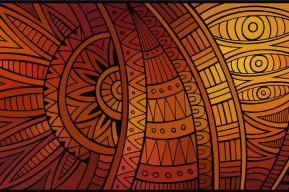Event
Decolonizing the teaching of Africa’s history
Knowledge of Africa’s history has long been dominated by Eurocentric perspectives, which has led to imbalanced forms of representation of the continent’s history and perpetuated preconceptions. To counter the skewed perspectives on how African history is taught and how Africa is perceived, in 1964 UNESCO launched the General History of Africa (GHA) project, reconstructing Africa’s history, freeing it from racial prejudices ensuing from the transatlantic slave trade and colonization. Several decades of cooperation between more than 230 historians and other specialists resulted in the publication of a collection of eight volumes, on the history of Africa, written by Africans, from a pan-African perspective. It is available in full or in part in 12 languages, including three African languages: Fulfulde, Hausa and Swahili.
However, despite the immense contribution of this publication to the decolonization of historical narratives, this still does not always translate into effective and impactful teaching and learning practices on the African continent, among the diaspora and beyond. The reappropriation of Africa’s historic narrative is vital to ensure a common identity and pride in Africa’s heritage, to foster an African approach to the production of knowledge and, ultimately, contribute to sustainable development in line with the African Union’s Agenda 2063 and the United Nations’ 2030 Sustainable Development Agenda.
This UNESCO Chairs Seminar – the second in a series of six centred on UNESCO’s Priority Africa - focused on the ways in which higher education institutions and research can significantly contribute to the transformation of teaching and learning of Africa's history. It covered approaches towards decolonizing the teaching and learning of Africa’s history across education systems, touching upon topics such as the development of knowledge commons and indigenous knowledge-based systems, and implications for teacher education institutes, curriculum and pedagogical transformation, and the use of African languages.
Framing the discussion, Cecilia Barbieri, Chief of Section for Global Citizenship and Peace Education at UNESCO, underscored the importance of the General History of Africa initiative in promoting peace, social cohesion, and a reappropriation of Africa’s identity, history and heritage. Anthony Ohemeng-Boamah, UNESCO Assistant Director-General for Priority Africa and External Relations stressed the role of higher education in advancing the historical understanding of Africa and its diaspora, citing Nigerian author Chinua Achebe who said: “until the lions have their own historians, the history of the hunt will always glorify the hunter.” The former Minister of Education of Senegal, Mamadou Ndoye, pointed out how the design of African historical education lacks scientific rigor and advocated for transformative educational reforms rather than mere add-ons to existing curricula. He highlighted the disruptive role of UNESCO’s GHA in challenging Eurocentric narratives and promoting a scientifically-backed African history.
“In essence [UNESCO’s General History of Africa] is an example of what needs to be done in terms of decolonizing history; epistemic disruption, affirming African perspectives of culture and history, and toppling colonialist narratives regarding Africa. Today, we need to undertake this reform.”
I see your spirit in bloom
Denise Bentrovato, Senior Researcher and Extraordinary Lecturer in History Education at the University of Pretoria (South Africa), followed with her insights on the marginalization of African experiences in mainstream European historical discourse, especially regarding world events such as the first World War. She argued for the integration of Indigenous knowledge and oral histories in curricula, emphasizing the importance of social history that includes the experiences of women and children. Bentrovato also noted the challenges in the current process of decolonization, such as the infrequency of curriculum revisions. Demonstrating an alternative medium of delivering history lessons and transmitting values, Injairu Kulundu-Bolus, Senior Lecturer in the Department of Education Futures Rhodes University (South Africa), delivered a rich and moving musical and poetic performance. The refrain “I see your spirit in bloom” captured the essence of her message of a reawakening of African ways of knowing and being.
“More than ever, there is a great need for this all-important project that is the GHA and its pedagogical use to reach and affect younger generations in and beyond Africa, at a time when racism, born out of ignorance, is rampant.”
A panel discussion entitled “The role of higher education institutions in transforming knowledge production and education through the General History of Africa” followed, moderated by Inés Dussel, Researcher and Professor at the Department of Educational Research, CINVESTAV (Mexico). Mohamed Camara, Chairman and Professor of History at Howard University (United States of America), brought in the perspective of the diaspora highlighting the university’s role in supporting Africans and suggested collaboration between UNESCO and Historically Black Colleges and Universities (HBCUs) to advance the GHA. He expressed concerns over the growing trend of Afrophobia in the USA and the censorship of educational content on critical race theory and structural racism. Camara also highlighted the potential of the GHA in promoting a neopanafricanism, and in particular, what he termed as “Transcendental Africanity,” particularly during Black History Month in the United States of America.
Samson Igor Bidossessi Guedegbec, UNESCO Chair on Human Rights and Democracy, University of Abomey-Calavi (Benin), underscored the need to popularize the GHA and adapt current educational programmes for effective teaching of a decolonized history. He called for a broader dissemination of the GHA to ensure its impact on global educational systems. Anny Ocoro Loango, Member of the UNESCO Chair on Higher Education and Indigenous and Afro-descendant Peoples in Latin America, Universidad Nacional Tres de Febrero (Argentina), lamented the overbearing influence of Eurocentric education systems in perpetuating systemic racism and the exclusion of African history in Latin America. She advocated for an overhaul of educational curricula to recognize Africa’s role as the cradle of humanity, promoting an epistemic reformation that acknowledges the continent’s historical significance.
The UNESCO Chairs Seminar brought to the forefront the diverse challenges and strategies in decolonizing Africa’s history. The insights from these experts not only shed light on the existing issues in historical education, but also charted a path forward for integrating African perspectives and narratives into global historical discourse.





